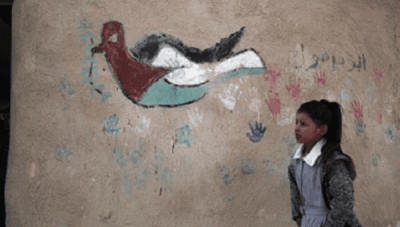With Tax Ruling, Israel’s Supreme Court Joins the Crackdown on Palestinian Civil Society

All Global Research articles can be read in 51 languages by activating the “Translate Website” drop down menu on the top banner of our home page (Desktop version).
To receive Global Research’s Daily Newsletter (selected articles), click here.
Visit and follow us on Instagram at @crg_globalresearch.
***
As global condemnation rains down on the Israeli authorities for designating six well-respected Palestinian nongovernmental organizations as terrorist organizations and an investigation suggests they used military-grade hacking tools to spy on Palestinian activists, the Israeli Supreme Court is quietly playing its own part in shrinking the space for Palestinian civil society to operate.
In an October 27 ruling, the Supreme Court denied tax-exempt status to an Israeli-registered group running a school in the West Bank because the school educates Palestinian, not Israeli, children. The precedent-setting decision imposes financial burdens on civil society groups providing services to Palestinians, including groups that step in to fulfil responsibilities that the Israeli government, the occupying power in the West Bank and Gaza, has flouted.
The court’s ruling means that Israeli-registered groups operating in the West Bank will get tax breaks if they provide services to Jewish Israelis living in unlawful settlements, but not if they provide services to Palestinians living under military occupation in the same territory.
“The precedent-setting decision imposes financial burdens on civil society groups providing services to Palestinians, including groups that step in to fulfil responsibilities that the Israeli government, the occupying power in the West Bank and Gaza, has flouted”
These are the facts that arise from the court ruling: For the past three decades, the Society of Islamic Sciences and Cultural Committee has run schools in the Israeli-occupied West Bank, including in East Jerusalem. The Society submits regular reports to the Israeli nonprofit registrar. In 2004, as Israeli authorities built a barrier that cuts East Jerusalem off from the rest of the West Bank, the organization closed its Jerusalem schools and maintained just one school, in Bir Nabala, a West Bank Palestinian town inside an enclave surrounded by walls and fences.
The separation barrier severs Bir Nabala from East Jerusalem and requires residents to access the rest of the West Bank through gates in the barrier and tunnels dug underneath it. Major roads in Bir Nabala, formerly commercial arteries, now reach a dead-end in an eight-meter-high concrete wall. After closing its Jerusalem properties, the Society rented them out to another educational organization, for a contracted annual sum of about US$600,000.
Section 9(2) of the Israeli Income Tax Ordinance exempts nonprofit organizations from income tax if they perform a “public purpose,” such as education. The ordinance does not specify a geographical scope for those services, and organizations serving Jewish residents of unlawful Israeli settlements in the West Bank receive Israeli income tax and other tax benefits.
Israeli Supreme Court Justices Isaac Amit, David Mintz, and Alex Stein ruled unanimously that the Society must pay tax on its rental income because running a school for Palestinian children in the West Bank is not a “public purpose” that the Israeli government will indirectly subsidize through the tax exemption.
Although the international law of occupation and international human rights law obligate Israel to ensure that Palestinian children in the West Bank are able to get quality education, and although the Palestinian Authority has no jurisdiction in Area C, where the school is located, the court found that educational services in Bir Nabala have no “link” to Israel for purposes of the tax law.
Incredibly, the decision also rests on a determination that the Israeli government cannot effectively oversee the activities of non-governmental organizations in “areas that are not under its control,” even though Israeli authorities maintain exclusive authority over the school’s neighbourhood in Bir Nabala, including tightly controlling travel into and out of the area, policing, licensing and construction.
Israeli officials are committing the crimes of apartheid and persecution.
The world needs to act on behalf of the millions of Palestinians being institutionally discriminated against. https://t.co/b7uzsDfiVD #Courage2FightApartheid pic.twitter.com/CrWtRUt51e
— Human Rights Watch (@hrw) April 27, 2021
The court rejected the Society’s argument that its school in Bir Nabala also serves Palestinians from East Jerusalem who hold Israeli residency and thus are “Israelis,” finding that the group failed to prove that claim and even made a statement denying it.
Some Palestinians with Israeli residence – especially those whose spouses hold West Bank ID cards and thereby cannot enter Jerusalem without rarely issued permits – indeed live in Bir Nabala and send their children to school there. But no Palestinian Jerusalemite would provide the Israeli authorities with evidence that their children attend school in Bir Nabala, because doing so could jeopardize their residency status, a fact that the court has failed to take into account. Israel conditions that status on the person’s connections to Jerusalem, among other factors, as part of a policy to ensure Jewish demographic superiority in Jerusalem.
The court decision is a binding precedent and a departure from previous practices. It places a financial burden on Israeli-registered groups that serve Palestinians living under Israeli occupation and is the latest example of Israel’s highest court rubber-stamping discriminatory practices that contribute to the crimes against humanity of apartheid and persecution, under an overall policy to maintain the domination by Jewish Israelis over Palestinians, even in matters of education.
*
Note to readers: Please click the share buttons above or below. Follow us on Instagram, @crg_globalresearch. Forward this article to your email lists. Crosspost on your blog site, internet forums. etc.
Sari Bashi is an Israeli lawyer and a special adviser at Human Rights Watch.
Featured image is from PressTV

